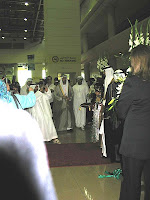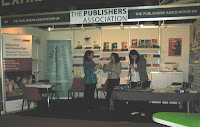The shop programme used for the Alex website (Actinic Catalog)was a major culture shock, even though I had been writing and updating my own websites for years. It took me months to get my head around the concept, and more months to get anywhere near a presentable website for 'Alex and Friends'. That was last year.
Now I have discovered how to use the Actinic 'library' to insert layouts from Dreamweaver as in the photogallery, and paragraphs containing more than one hyperlink. Such a major step forward I had to shout from the rooftops... Yay!
Wednesday, 25 March 2009
Tuesday, 24 March 2009
GESS 2009 Report
Tuesday, 17 March 2009
GESS (Gulf Educational Supplies Show) Dubai

Our contact at The Publishers Association (PA) suggested that this would be a good venue for us. It attracted a UKTI grant (to encourage export). We jumped.
The PA organised a joint stand under the auspices of BESA who incidentally had the coffee machine on the stand next door to us.
The organisers went to a lot of effort. The Sheik was scheduled to open the exhibition on the first morning. We were asked to arrive early (security). As is traditional, two children were there to present flowers to the Minister of Education at the opening of the exhibition, and Sarah (from GESS) came looking for a gift for a girl aged 10 and a boy aged 7 to be presented to them on a cushion. Our book and one from Mantra Lingua were rushed to do the honours.
Saturday, 14 March 2009
Pitfalls of 'Translations'
We had been advised to take a leaflet in Arabic to the GESS Exhibition in Dubai. It proved excellent advice. With zero knowledge of Arabic, we started with a translation agency, one which had been recommended to us.
They made several mistakes, firstly in layout, making it impossible for us to drop the outline .eps files into our leaflet, then we spotted no less than three mistakes in the English address, which shouldn't really have been re-keyed. This made our noses twitch. So Steve took the 'professional' translation to work and asked an Egyptian colleague to cast an eye over the Arabic translation and give an opinion.
The Egyptian colleague (Yasser) said it made no sense, it was translated so literally that it could have been done by translation software. We sent it back to the agency and they had two more goes at it with no better results. In the end Yasser translated it for us himself and we had all the problems coping with the RtoL script as described in the last post.
I took both versions to the exhibition and asked opinions. Yasser's version explained our book and audio CDs, rather than 'translated' our leaflet. The original leaflet had of course been aimed at the English speaking market. So Yasser's explanation made far more sense to the Arabic speaking world than did the literal translation.
This was corroborated by the rep from the British Embassy, Cairo, who said they always have to get translations from the UK re-worked; and ditto from the British Embassy Jordan, who talked me through the whole agency translation explaining word for word what was wrong with it.
So in the end, we were lucky. Just think. We are a multilingual enterprise, present under the auspices of the UKTI. A tacky translation would have completely undermined our street cred.
There are more lessons here - but we're not completely sure about recommending a solution. Trust is the key. If you possibly can, seek a first hand, trustworthy solution to any translation requirements.
They made several mistakes, firstly in layout, making it impossible for us to drop the outline .eps files into our leaflet, then we spotted no less than three mistakes in the English address, which shouldn't really have been re-keyed. This made our noses twitch. So Steve took the 'professional' translation to work and asked an Egyptian colleague to cast an eye over the Arabic translation and give an opinion.
The Egyptian colleague (Yasser) said it made no sense, it was translated so literally that it could have been done by translation software. We sent it back to the agency and they had two more goes at it with no better results. In the end Yasser translated it for us himself and we had all the problems coping with the RtoL script as described in the last post.
I took both versions to the exhibition and asked opinions. Yasser's version explained our book and audio CDs, rather than 'translated' our leaflet. The original leaflet had of course been aimed at the English speaking market. So Yasser's explanation made far more sense to the Arabic speaking world than did the literal translation.
This was corroborated by the rep from the British Embassy, Cairo, who said they always have to get translations from the UK re-worked; and ditto from the British Embassy Jordan, who talked me through the whole agency translation explaining word for word what was wrong with it.
So in the end, we were lucky. Just think. We are a multilingual enterprise, present under the auspices of the UKTI. A tacky translation would have completely undermined our street cred.
There are more lessons here - but we're not completely sure about recommending a solution. Trust is the key. If you possibly can, seek a first hand, trustworthy solution to any translation requirements.
Subscribe to:
Comments (Atom)

 More photos of the exhibition here.
More photos of the exhibition here. 